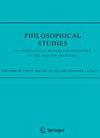形而上学解释和宇宙论论证
IF 1.1
1区 哲学
0 PHILOSOPHY
引用次数: 0
摘要
莱布尼兹宇宙论的或然性论证有一个前提,即任何或然性事实都无法解释为什么存在任何或然性事实。大卫-休谟(David Hume)和保罗-爱德华兹(Paul Edwards)对这一前提进行了著名的否定,他们认为,如果每个事实都可以用更多的事实来解释,那么所有事实都是如此。这就是著名的休谟-爱德华兹原理(HEP)。在本文中,我将在形而上学解释或基础的框架内考察宇宙论的或然性论证,并为 HEP 的基础理论版本辩护。本文章由计算机程序翻译,如有差异,请以英文原文为准。

Metaphysical explanation and the cosmological argument
A premise of the Leibnizian cosmological argument from contingency says that no contingent fact can explain why there are any contingent facts at all. David Hume and Paul Edwards famously denied this premise, arguing that if every fact has an explanation in terms of further facts ad infinitum, then they all do. This is known as the Hume–Edwards Principle (HEP). In this paper, I examine the cosmological argument from contingency within a framework of metaphysical explanation or ground and defend a ground-theoretic version of HEP which says, roughly, that the plurality of contingent facts is grounded in its members.
求助全文
通过发布文献求助,成功后即可免费获取论文全文。
去求助
来源期刊

PHILOSOPHICAL STUDIES
PHILOSOPHY-
CiteScore
2.60
自引率
7.70%
发文量
127
期刊介绍:
Philosophical Studies was founded in 1950 by Herbert Feigl and Wilfrid Sellars to provide a periodical dedicated to work in analytic philosophy. The journal remains devoted to the publication of papers in exclusively analytic philosophy. Papers applying formal techniques to philosophical problems are welcome. The principal aim is to publish articles that are models of clarity and precision in dealing with significant philosophical issues. It is intended that readers of the journal will be kept abreast of the central issues and problems of contemporary analytic philosophy.
Double-blind review procedure
The journal follows a double-blind reviewing procedure. Authors are therefore requested to place their name and affiliation on a separate page. Self-identifying citations and references in the article text should either be avoided or left blank when manuscripts are first submitted. Authors are responsible for reinserting self-identifying citations and references when manuscripts are prepared for final submission.
 求助内容:
求助内容: 应助结果提醒方式:
应助结果提醒方式:


